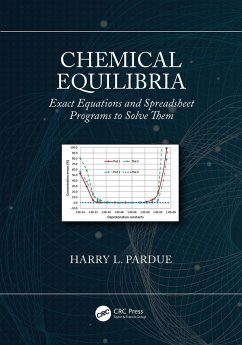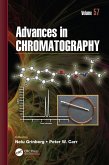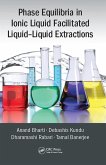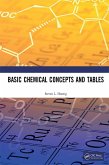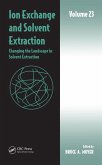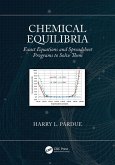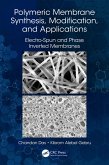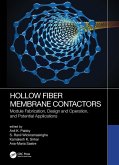Harry L. Pardue
Chemical Equilibria (eBook, ePUB)
Exact Equations and Spreadsheet Programs to Solve Them
74,95 €
74,95 €
inkl. MwSt.
Sofort per Download lieferbar

37 °P sammeln
74,95 €
Als Download kaufen

74,95 €
inkl. MwSt.
Sofort per Download lieferbar

37 °P sammeln
Jetzt verschenken
Alle Infos zum eBook verschenken
74,95 €
inkl. MwSt.
Sofort per Download lieferbar
Alle Infos zum eBook verschenken

37 °P sammeln
Harry L. Pardue
Chemical Equilibria (eBook, ePUB)
Exact Equations and Spreadsheet Programs to Solve Them
- Format: ePub
- Merkliste
- Auf die Merkliste
- Bewerten Bewerten
- Teilen
- Produkt teilen
- Produkterinnerung
- Produkterinnerung

Bitte loggen Sie sich zunächst in Ihr Kundenkonto ein oder registrieren Sie sich bei
bücher.de, um das eBook-Abo tolino select nutzen zu können.
Hier können Sie sich einloggen
Hier können Sie sich einloggen
Sie sind bereits eingeloggt. Klicken Sie auf 2. tolino select Abo, um fortzufahren.

Bitte loggen Sie sich zunächst in Ihr Kundenkonto ein oder registrieren Sie sich bei bücher.de, um das eBook-Abo tolino select nutzen zu können.
Concepts, procedures and programs described in this book make it possible for readers to solve both simple and complex equilibria problems quickly and easily and to visualize results in both numerical and graphical forms. The reader can then spend more time thinking about what the results mean in terms of the larger problem being worked on.
- Geräte: eReader
- mit Kopierschutz
- eBook Hilfe
- Größe: 5.49MB
Andere Kunden interessierten sich auch für
![Advances in Chromatography, Volume 57 (eBook, ePUB) Advances in Chromatography, Volume 57 (eBook, ePUB)]() Advances in Chromatography, Volume 57 (eBook, ePUB)48,95 €
Advances in Chromatography, Volume 57 (eBook, ePUB)48,95 €![Phase Equilibria in Ionic Liquid Facilitated Liquid-Liquid Extractions (eBook, ePUB) Phase Equilibria in Ionic Liquid Facilitated Liquid-Liquid Extractions (eBook, ePUB)]() Anand BhartiPhase Equilibria in Ionic Liquid Facilitated Liquid-Liquid Extractions (eBook, ePUB)48,95 €
Anand BhartiPhase Equilibria in Ionic Liquid Facilitated Liquid-Liquid Extractions (eBook, ePUB)48,95 €![Basic Chemical Concepts and Tables (eBook, ePUB) Basic Chemical Concepts and Tables (eBook, ePUB)]() Steven L. HoenigBasic Chemical Concepts and Tables (eBook, ePUB)52,95 €
Steven L. HoenigBasic Chemical Concepts and Tables (eBook, ePUB)52,95 €![Ion Exchange and Solvent Extraction (eBook, ePUB) Ion Exchange and Solvent Extraction (eBook, ePUB)]() Ion Exchange and Solvent Extraction (eBook, ePUB)47,95 €
Ion Exchange and Solvent Extraction (eBook, ePUB)47,95 €![Chemical Equilibria (eBook, PDF) Chemical Equilibria (eBook, PDF)]() Harry L. PardueChemical Equilibria (eBook, PDF)74,95 €
Harry L. PardueChemical Equilibria (eBook, PDF)74,95 €![Polymeric Membrane Synthesis, Modification, and Applications (eBook, ePUB) Polymeric Membrane Synthesis, Modification, and Applications (eBook, ePUB)]() Chandan DasPolymeric Membrane Synthesis, Modification, and Applications (eBook, ePUB)48,95 €
Chandan DasPolymeric Membrane Synthesis, Modification, and Applications (eBook, ePUB)48,95 €![Hollow Fiber Membrane Contactors (eBook, ePUB) Hollow Fiber Membrane Contactors (eBook, ePUB)]() Hollow Fiber Membrane Contactors (eBook, ePUB)69,95 €
Hollow Fiber Membrane Contactors (eBook, ePUB)69,95 €-
-
-
Concepts, procedures and programs described in this book make it possible for readers to solve both simple and complex equilibria problems quickly and easily and to visualize results in both numerical and graphical forms. The reader can then spend more time thinking about what the results mean in terms of the larger problem being worked on.
Dieser Download kann aus rechtlichen Gründen nur mit Rechnungsadresse in A, B, BG, CY, CZ, D, DK, EW, E, FIN, F, GR, HR, H, IRL, I, LT, L, LR, M, NL, PL, P, R, S, SLO, SK ausgeliefert werden.
Produktdetails
- Produktdetails
- Verlag: Taylor & Francis eBooks
- Seitenzahl: 267
- Erscheinungstermin: 15. November 2018
- Englisch
- ISBN-13: 9780429771330
- Artikelnr.: 54672970
- Verlag: Taylor & Francis eBooks
- Seitenzahl: 267
- Erscheinungstermin: 15. November 2018
- Englisch
- ISBN-13: 9780429771330
- Artikelnr.: 54672970
- Herstellerkennzeichnung Die Herstellerinformationen sind derzeit nicht verfügbar.
I was born and grew up in southern West Virginia where I attended public schools and graduated from Chapmanville High School in May, 1953. I enrolled as a chemistry major in Marshall College, Marshall University now, in June 1953 and graduated with BS and MS degrees in 1956 and 1957, respectively. I then enrolled as a graduate student in the Department of Chemistry and Chemical Engineering at the University of Illinois in Urbana/Champaign in September 1957. I joined Prof. H. V. Malmstadt's research group during the summer of 1958 and earned a PhD degree with emphasis in analytical chemistry in June, 1961. I then joined the faculty in the Department of Chemistry at Purdue University in September of that year.
I served as Head of the Analytical Division in the department from 1969 to 1975 and as Head of the Department of Chemistry from 1983 - 1987. I served as the American Editor for Analytica Chimica Acta for more than ten years, as Chairman of the Division of Analytical Chemistry of the American Chemical Society for one year and on numerous committees for a variety of professional societies.
I continued my teaching and research activities until I retired in 2002. My teaching responsibilities included freshman chemistry, introductory analytical chemistry, instrumental analysis and graduate level courses involving advanced analytical chemistry and chemical instrumentation. I was frequently ranked among the top ten teachers in the Purdue University School of Science. My teaching awards included Best Teacher in the School of Science, 2001, The Arthur E. Kelley Award as the Best Teacher in the Purdue University Department of Chemistry, 1992, 2001, and appointment to the Purdue University Teaching Academy in 2001
My research focused on chemical instrumentation and advances in kinetic-based methods. I directed the thesis research of some sixty masters and doctoral students and was the lead author on more than 175 scientific papers. Research awards include the ACS Award in Analytical Chemistry sponsored by Fisher Scientific, The Anachem Award for distinguished service to analytical chemistry, The Chemical Instrumentation Award, The Association for Clinical Chemistry Award for contributions to clinical chemistry and The Samuel Natelson Award for Advancements in Clinical Chemistry.
After I retired in 2002 I continued as a visiting professor for two years during which time I worked with two graduate students, Ihab Odeh and Twelde Tesfai, to expand the scope of the introductory course in analytical chemistry and to develop a new set of experiments for the course. Some changes were to decrease emphasis on analyzing unknowns and increase emphasis on several topics including automated titrations, liquid chromatography, derivative spectroscopy, kinetic-based methods, applications of enzymes as selective reagents and the use of computers to collect and process laboratory results. I have seldom worked harder, had more fun or been more pleased with the results of our efforts.
I served as Head of the Analytical Division in the department from 1969 to 1975 and as Head of the Department of Chemistry from 1983 - 1987. I served as the American Editor for Analytica Chimica Acta for more than ten years, as Chairman of the Division of Analytical Chemistry of the American Chemical Society for one year and on numerous committees for a variety of professional societies.
I continued my teaching and research activities until I retired in 2002. My teaching responsibilities included freshman chemistry, introductory analytical chemistry, instrumental analysis and graduate level courses involving advanced analytical chemistry and chemical instrumentation. I was frequently ranked among the top ten teachers in the Purdue University School of Science. My teaching awards included Best Teacher in the School of Science, 2001, The Arthur E. Kelley Award as the Best Teacher in the Purdue University Department of Chemistry, 1992, 2001, and appointment to the Purdue University Teaching Academy in 2001
My research focused on chemical instrumentation and advances in kinetic-based methods. I directed the thesis research of some sixty masters and doctoral students and was the lead author on more than 175 scientific papers. Research awards include the ACS Award in Analytical Chemistry sponsored by Fisher Scientific, The Anachem Award for distinguished service to analytical chemistry, The Chemical Instrumentation Award, The Association for Clinical Chemistry Award for contributions to clinical chemistry and The Samuel Natelson Award for Advancements in Clinical Chemistry.
After I retired in 2002 I continued as a visiting professor for two years during which time I worked with two graduate students, Ihab Odeh and Twelde Tesfai, to expand the scope of the introductory course in analytical chemistry and to develop a new set of experiments for the course. Some changes were to decrease emphasis on analyzing unknowns and increase emphasis on several topics including automated titrations, liquid chromatography, derivative spectroscopy, kinetic-based methods, applications of enzymes as selective reagents and the use of computers to collect and process laboratory results. I have seldom worked harder, had more fun or been more pleased with the results of our efforts.
